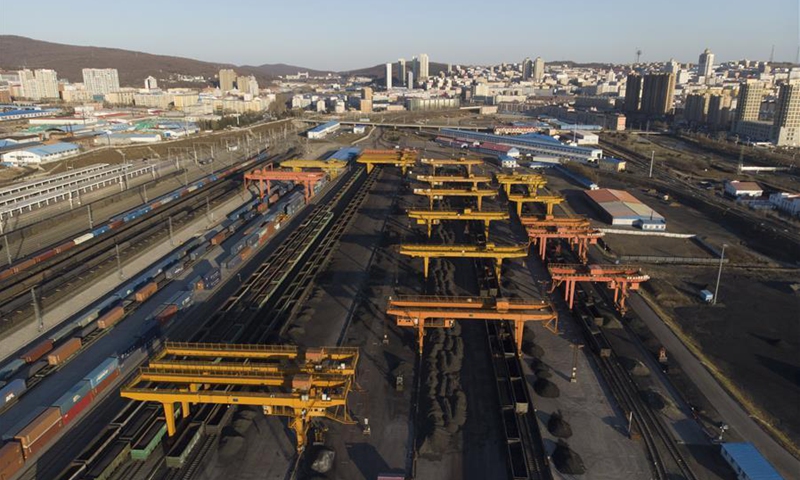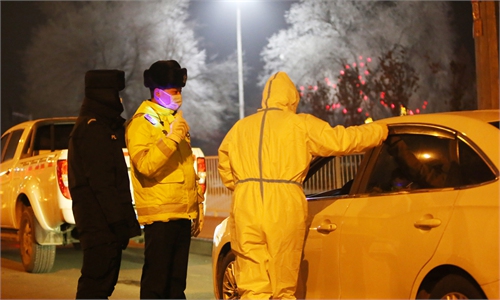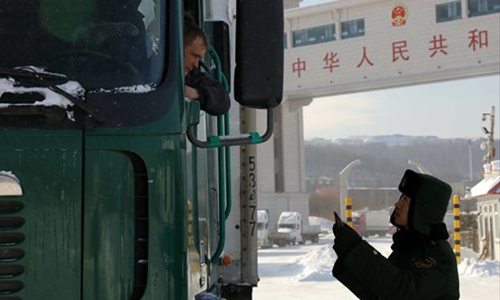
Aerial photo taken on Oct. 28, 2020 shows a view of Suifenhe Railway Port in Suifenhe, northeast China's Heilongjiang Province. As of Tuesday, the 2020 import and export volume of the Suifenhe Railway Port, an important Chinese port for trade with Russia, hit 8.009 million tons, of which mineral powder imports increased by 64 percent year on year. (Photo by Zhang Tao/Xinhua)
Some of China's port cities, which have been at the frontline in fending off the risks of imported COVID-19 cases over the past two years, were again caught in a resurgence of coronavirus cases in recent days.
After Khorgas in Northwest China's Xinjiang reported some new cases on Monday, Suifenhe, a port city on the China-Russia border, reported new cases linked to imported grain, which spilled over to a neighboring city.
Suifenhe, a major China-Russia border port city in Northeast China's Heilongjiang Province, reported three confirmed COVID-19 cases and nine asymptomatic cases on Tuesday, all related to imported grain shipments. Dongning, a city about 50 kilometers from Suifenhe, reported one positive case - a truck driver for a trade company who just returned from Suifenhe.
Among the 12 people who tested positive in Suifenhe, five were in charge of unloading the imported grain, and one was in charge of imported grain transportation. The other six people are relatives of those workers and one lived in the same building, according to local authorities.
Both these cities in Heilongjiang are major land ports and they have been conducting routine full-scale nucleic acid tests every five days.
The source that triggered the current flare-up remains unknown. Some local residents in Suifenhe reached by the Global Times on Tuesday said the city has stepped up efforts in containing the virus' spread.
A local businessman who works at the Suifenhe port told the Global Times on Tuesday on condition of anonymity that they were told not to leave the city unless it's necessary.
The new flare-up came after Khorgas, China’s largest land port in Xinjiang region on the China-Kazakhstan border, reported eight confirmed cases and 22 asymptomatic cases as Tuesday, and the Ili Kazak Autonomous Prefecture where the city is located initiated an emergency response, local officials said on Monday.
Zhang Yuexin, a Xinjiang-based epidemic expert, told the Global Times on Tuesday that the resurgence in port cities continues to mount as the epidemic overseas is rampant, and the virus tends survive longer in low temperatures.
The sources of these port-related outbreaks are most likely goods from overseas countries and regions, because it is impossible to ensure 100 percent disinfection of goods. That may lead to domestic flare-ups via goods-to-human transmission, Zhang noted.
A staffer working at the Khorgas port told the Global Times on Tuesday that "currently, the port operates normally."
The Global Times learned from some locals that instead of locking down the entire city after the epidemic resurgence, as in previous outbreaks, this round is being dealt with more precise anti-epidemic measures, with only places where COVID-19 patients had been to were sealed off. Other than that, public venues in the city such as restaurants and supermarkets operate normally.
In 2021, China was been hit by several flare-ups linked to port and border cities such as Ruili in Southwest China's Yunnan Province, Manzhouli, North China's Inner Mongolia Autonomous Region, and Dalian, Northeast China's Liaoning. Some cities like Ruili went through at least three rounds of lockdowns in 2021 due to the imported cases.
It was also not the first time for Suifenhe to handle a flare-up. A local official told the Global Times on Tuesday on condition of anonymity that as people live in border cities, they have gained experience in emergency response.
"From Tuesday, local officials and community workers began working 24 hours a day at entrances to residential compounds, strictly following the rules such as body temperature checks and mandatory mask-wearing," she said, noting that as local residents have gone through the resurgence of cases at least twice over the past two years, they know what to do now.




